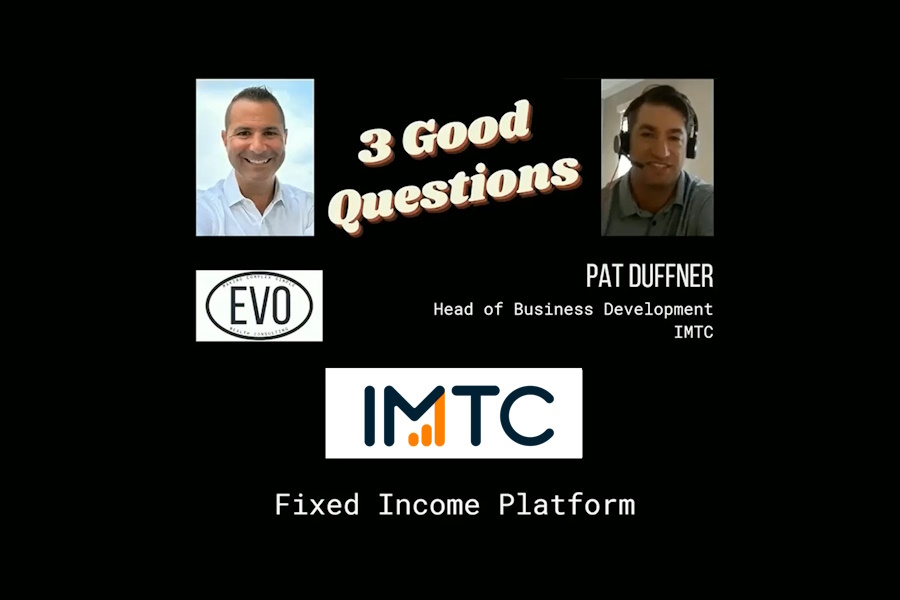The Future of ESG in Fixed Income

“While ESG was once an ancillary topic reserved for specific circles, the increased focus on environmental and social causes has made it a focal point for investors around the world,” highlights Russell Feldman, COO of IMTC. ESG within fixed income has become even more prevalent, though, many believe fixed income analysis inherently has always had elements of ESG focus.
The question, however, lies in what the future of ESG holds in fixed income, which is why IMTC brought together knowledgeable, articulate panelists to discuss how ESG/sustainability issues are affecting fixed income markets, issuers, and investors globally. Here is a summary of some of the issues they discussed, but we encourage you to watch the full on-demand webinar — trust us, the time will fly by.
Moderator Alex Struc, CEO & CIO of GoalsFirst Investment Management, framed the discussion by stating that despite the widely accepted view that Europe is the leader in ESG, the discussion would focus on the pent-up demand for, expertise in, and growing recognition of widespread ESG investing in the U.S.
ESG and sustainability: all-encompassing goal and pervasive risk management concern
What is the biggest opportunity in the sustainable investment space, and what can investors not afford to ignore in this area when looking at risk-adjusted returns?
“All investing must consider ESG, representing a fundamental change in the way we manage money,” stated Ksenia Koban, SVP and Municipal Strategist at Payden & Rygel and co-Chair of the firm’s ESG committee. She observed that the transition to a lower carbon economy (and therefore low carbon portfolios) represents risks, but also opportunity, especially for bond investors given the vast amount of capital the fixed income markets represent.
Tim Coffin, SVP and director of sustainability at Breckinridge Capital Advisors observed that with fixed income, especially in the municipal arena where there is so much duration risk, performance depends on the reliability and resilience of future cash flows, and that future resilience is what ESG is all about. “As fixed income investors, we are supposed to get ahead of potential calamities and identify dormant liabilities, and ESG does a great job of identifying symptoms of risk.”
Struc prompted the panelists to consider whether capital markets could help issuers to take pre-emptive measures, instead of just reacting to lawsuits related to environmental disasters. Koban responded that “there is a growing recognition that green and sustainability bonds give investors a way to navigate around C-VaR (Climate Value at Risk), and signal to asset managers and investors that muni bond issuers are aware of risks in the context of their public mission.”
She added, “green and sustainability bonds help issuers to prioritize and monitor projects, and measure their impact — if the outcomes miss the mark, we need to adjust and recalibrate.” She views these products as a bridge to what all muni financing will look like in ten years: “they are an opportunity for investors and asset managers to determine what will be important in terms of metrics and outcomes for all financings.”
Investor engagement and education, and the impact on issuers
There was extensive discussion of the importance of educating and engaging with clients about the importance of sustainability in the corporate and municipal bond markets.
Coffin stated that sustainability makes his firm’s commitment to the investment process even more intentional, as the concept of stewardship is now incorporated into the evaluation of predictable, long-term, reliable returns. “Having a sense of stewardship is in our clients’ best interest,” he noted, and meaty conversations about this issue are at the heart of client relationships.
Eric Glass, SVP and senior portfolio manager of fixed income impact strategies at AllianceBernstein, offered this innovative perspective: “At our firm, we are building coalitions of like-minded investors,” to join forces in informing users of capital (corporates, states, and municipalities) that they need to make changes, or investors will not be willing to fund them. “As more and more companies announce intentions to become net zero over the next 10-15 years, the capital markets have to be supportive. Investors need to send a clear message that this is a critical, existential issue.” He noted that the transition to a low-carbon economy involves a huge amount of value — some say $90 trillion-plus — the capital markets will have to embrace sustainability goals.
The muni market: Impact ownership, alpha, and the election cycle
Alex Struc asked about how the concept of impact affects muni issuers and investors. More specifically, he asked the panelists about impact ownership, its relationship to investing, and whether that ownership can last beyond a given election cycle.
“We view impact in the muni market using the concept of essentiality,” Tim Coffin offered. “Communities stand behind their most essential projects, such as schools and transportation to get people to/from work and school. Therefore, we look at the essentiality of sustainable developments that issuers are seeking to fund. Local governments are going to finance the adaptation and transition to more sustainable conditions because their communities will support it.”
Koban added that stakeholder pressure underpins municipalities’ projects and the broad, diverse nature of the stakeholder base gives a project energy and momentum that outlasts the election cycle. “Younger generations that will soon become our primary asset owners are solidly committed to sustainability.”
Alex Struc specifically sought Glass’ view on how the infrastructure bill being discussed in the U.S. relates to alpha for muni investors, defining alpha in terms of risk, return, and impact. Eric responded with another unique insight, saying “from an impact investing perspective, the Biden administration’s infrastructure proposal delivers alpha in the form of environmental justice.” He cited the example of replacing lead pipes in a community’s water system: “the impact is immediate and just – that’s where the alpha lies.”
Eric also noted that, in terms of essentiality (per Tim Coffin’s comments), muni investors need to ask marginalized communities what issues are most important at the local level and that public debt burdens should not disproportionately fall on disadvantaged communities. He cautioned that although the muni market provides visibility in terms of use of proceeds, sometimes you have to dig deep to understand what use of proceeds represents; self-labeling can be dangerous and he advocated for standards in this arena.
ESG growth opportunities in fixed income
The webinar wrapped up with interesting insights into the future of ESG in fixed income. The top highlights were:
- Greatest growth opportunities in sustainable finance: The panelists were divided as to which market will experience greater growth in sustainable finance over the next five years. Tim Coffin and Ksenia Koban argued for the U.S. (for different reasons), while Eric Glass identified Asia as the hottest growth area, noting the demographics represent a tremendous opportunity.
- Public officials moving ESG solutions forward: One audience question asked the panelists what they would like public officials to know about capital markets to help move ESG solutions forward, and Ksenia Koban quipped, “that the muni capital markets exist!” Tim Coffin and Eric Glass agreed that public officials should know that financing at the local level is effective, and that local officials have the best understanding of local infrastructure needs.
- Technology & data to support sustainable investing: When asked about the biggest need in terms of technology and data to support sustainable investing, Eric Glass said, “there is an ESG data arms race going on. The data is out there; we need to aggregate it in a usable way.” Ksenia Koban agreed, explaining, “modeling is complicated and coverage is incomplete. I hope data will take us to greater predictability in the coming years.”
Lastly, Alex Struc asked which of the Sustainable Development Goals the panelists would choose as the “super-goal” to unlock the others in terms of impact. He noted that, having spoken to people inside and outside of the investment arena, points of view differ widely, depending upon where you live. The panelists also differed – watch the recording to find out which goal each of them chose.
Technology to customize ESG & impact strategies at scale
Fixed income investors often struggle with highly personalized strategies, such as ESG or impact portfolios, because of the time-intensive research processes, limiting how many strategies they can manage. Some of our clients came to IMTC because of our unique ability to help portfolio managers to customize strategies across portfolios at scale.
More specifically, IMTC’s investment management system provides an easier way to:
- Adhere to unique investment guidelines and compliance rules
- Optimize portfolios across accounts
- Access ESG / green bonds via our sell-side partnerships
Technology is only as good as how it is used. IMTC is designed by and for fixed income professionals, empowering them to take action and make decisions quickly and accurately with real-time data and analytics capabilities. It allows you to future-proof your business; driving operational efficiencies, mitigating risk and delivering performance, to ultimately enable business growth. Learn more about IMTC.





